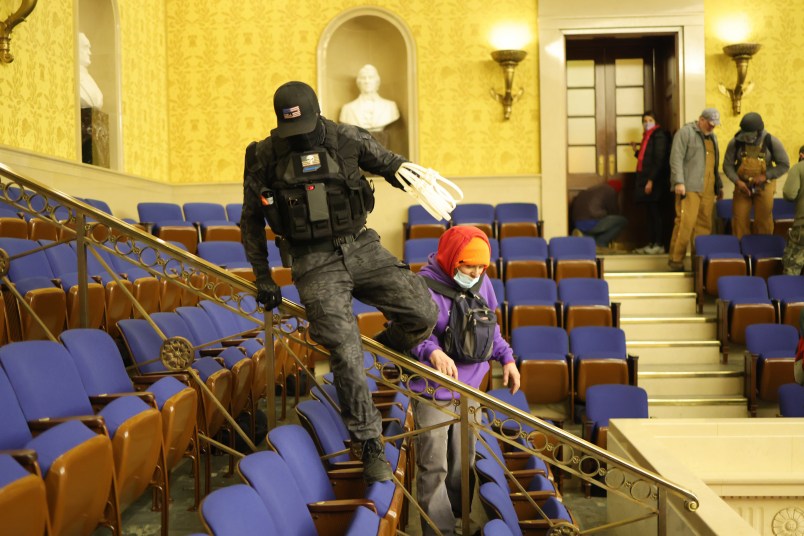The House of Representatives shuttered itself on Thursday amid threats of a violent far-right assault. The exact nature of those threats remain unknown, but it’s only the latest marker of what’s been true for months: threats of violence, credible and not, are intimidating the country’s political leadership.
And though the decision to close the House on Thursday was taken by the body’s Democratic leadership, it’s a bipartisan problem.
“I think President Trump has a responsibility to tell them to stand down,” said Rep. Michael McCaul (R-TX) in a Wednesday interview with CNN about the threats against the Capitol. “This threat is credible. It’s real.”
Since the Jan. 6 insurrection attempt, the country has turned its attention to the problem of far-right extremism. It’s a movement that, as egged on by former President Trump, turns rank-and-file Republican into what were once seen as fringe radicals.
And though the Biden administration is reviewing the scope of this movement, the response to warnings around March 4 illustrates the extent to which white nationalist threats have embedded themselves in the minds of top policymakers.
“It’s more than just a victory — it’s another example of the impact extremists are able to have,” Oren Segal, vice president of the Anti-Defamation League’s Center on Extremism, told TPM.
Segal added that groups his organization tracks are aware that they’re under threat from federal law enforcement in the aftermath of Jan. 6, and see the recognition of this sort — cancelling a session of Congress — as a win.
“Cancelling something like that is not insignificant,” Segal said. “Doing so because of the threat of violence to me is an act of extremism in and of itself.”
But it’s not just contained to March 4 or Jan. 6. Take a look at the ten Republicans who voted to impeach the former President.
Rep. Anthony Gonzalez (R-OH), in a a podcast interview last month, cited “personal safety issues” in the aftermath of his vote to impeach Trump.
“Frankly, we’re still trying to navigate that as a family, but, in terms of the political consequences, they are what they are and we’ll manage them as they come up,” Gonzalez said.
Rep. Peter Meijer (R-MI) said that he was getting fitted for body armor after the vote and was planning to have an armed escort.
And Rep. Adam Kinzinger (R-IL), the House Republican who has made a name for himself by loudly calling out the party’s ties to the extreme right, said that had the impeachment vote been secret, “a ton” of Republicans would have voted to impeach.
The argument that threats of violence prevented Republicans from voting to impeach and later convict Trump can be a convenient thing to tell journalists, but it does underscore a reality: these threats are persistent, and Jan. 6 proved to many lawmakers that they’re real.
Segal, the ADL official, emphasized to TPM that many of the threats his groups track range from those emanating from organized militia groups to random people hiding behind anonymous online accounts.
“This is really in some ways giving a lot of power to a relatively fringe sort of movement,” Segal said. “It fundamentally undermines democracy when people are able to impact our elected officials by making comments that are anonymous in the comfort of their own home — thats not democracy, that’s a perversion of what it’s all about.”
But those same online threats have already wrought grim consequences.
Al Schmidt, Philadelphia’s Republican elections commissioner, faced a torrent of death threats against him and his family after committing to count every vote cast in his jurisdiction. He implored Sen. Mitch McConnell (R-KY) to take that into account when voting on whether to convict Trump, but to no avail.
.@LeaderMcConnell The former POTUS incited supporters to threaten to kill my children and put their “heads on spikes” because we counted votes cast by eligible voters. They named my children and included my home address in the threats. Please consider when voting your conscience.
— Commissioner Al Schmidt (@Commish_Schmidt) February 13, 2021
It’s hard to say whether the threat of violence is shaping the year’s legislative calendar, beyond perhaps the introduction of the Domestic Terrorism Prevention Act.
But to Segal, the question isn’t so much one of whether elected officials are allowing themselves to be intimidated. Rather, the question is whether certain elected officials see the extremist groups behind the threats as their political base.
“How that’s going to land on the policymakers, if that’s going to have a true impact on how they vote or their actions, remains to be seen,” he said. “I would hate to think that these extremist fringes are in any way viewed as a base for some of these elected officials, but that’s the gray area that we’re trying to figure out.”







In the months prior to the 9/11 attacks in 2001, George Tenet, then CIA Director, reported that the intelligence warnings were “blinking red” indicating the probability of a terrorist threat from Al-Qaeda loyal to Osama bin Laden and/or other international terrorist groups. Every indication and news report now is that the system is again “blinking red,” only this time from several domestic militia/terrorist groups loyal to Donald Trump. Trump could - but won’t - address the situation and renounce such groups and their threats. Indeed, in the past he has incited such groups. Many Repubs are cowards and support Trump, directly or indirectly, others remain silent. It is deplorable.
Rump will not call off the insurrectionist traitors. He revels in the worship they show him. And Republican members of Congress make it worse through their cowardice. They support a carnival barker, a lover of dictators, a grifter, one who is immoral and devoid of conscience. Since Trump likes to name names and call people names, here’s one: Donald Trump. Liar. Coward. Fascist. Tax Fraud. Business Cheat. Traitor.
TPM–
Violence has shaped our national politics since at least the 1770s.
You’re welcome.
Yes, I found that bizarre, too!
Very cool!